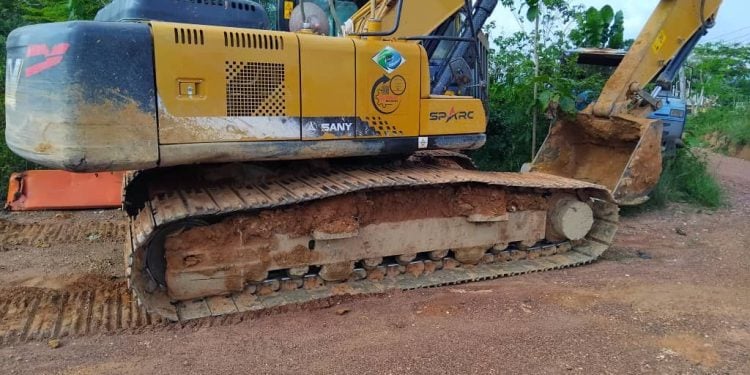The Eastern Regional Minister, Rita Adjei Awatey, announced the seizure of ten excavators used in illegal mining operations, signifying a renewed effort to combat the pervasive issue of “galamsey,” the local term for illegal small-scale mining. This action underscores the ongoing struggle against this environmentally destructive practice, which has plagued Ghana for years, leaving a trail of polluted rivers, degraded lands, and jeopardized communities. The excavators represent not just equipment, but a symbol of the persistent challenge posed by galamsey, and the government’s resolve to confront it. This latest seizure is a tangible step in a renewed campaign to protect the region’s natural resources and ensure sustainable development, a testament to the continued importance placed on this critical issue.
Galamsey’s detrimental impact on Ghana’s environment is undeniable. Major rivers like the Pra, Ankobra, and Offin, vital lifelines for communities and ecosystems, have been heavily polluted by the unregulated discharge of mining waste, including mercury and other heavy metals. This pollution contaminates drinking water sources, poses significant health risks to local populations, and disrupts aquatic life. Furthermore, galamsey operations contribute to widespread deforestation, stripping the land of its protective tree cover, leading to soil erosion, loss of biodiversity, and increased vulnerability to climate change. The fertile lands that once supported agriculture and livelihoods are rendered barren and unproductive, exacerbating economic hardship and food insecurity in affected areas. The environmental consequences of galamsey are a stark reminder of the urgent need for effective and sustained interventions.
Despite previous government initiatives such as Operation Vanguard and Galamstop, aimed at curbing illegal mining, the practice continues to proliferate. These operations involved the deployment of military and police personnel to mining sites, the seizure of equipment, and the arrest of illegal miners. However, the success of these interventions has been limited due to a complex interplay of factors. Economic hardship, particularly in rural areas, drives many individuals to engage in galamsey as a means of survival, despite the risks. Weak enforcement of existing laws and regulations, coupled with corruption and political interference, creates loopholes that illegal miners exploit. The global demand for gold, and the consequent price surges, further incentivizes galamsey, making it a lucrative, albeit illegal, enterprise. Addressing the root causes of galamsey, strengthening enforcement mechanisms, and fostering alternative livelihood opportunities are crucial for achieving long-term success in combating this destructive practice.
Minister Awatey’s announcement of the excavator seizures underscores the government’s renewed commitment to tackling galamsey. Her statement that these seizures are part of a focused operation acknowledges the persistent nature of the problem and the need for a concerted and sustained effort. By highlighting the connection between combating illegal mining and ensuring the success of other development initiatives, Minister Awatey emphasizes the importance of addressing this issue as a prerequisite for broader economic and social progress. The seizure of the excavators sends a strong signal to illegal mining operators that their activities will not be tolerated and that the government is taking concrete action to enforce the law.
The fight against galamsey is not merely about seizing equipment or arresting individuals; it is about safeguarding the future of Ghana. Protecting the environment, preserving water resources, and restoring degraded lands are essential for ensuring the long-term health, well-being, and prosperity of all citizens. By addressing the root causes of illegal mining, such as poverty and unemployment, and by providing alternative livelihood opportunities, the government can help break the cycle of dependence on galamsey. Strengthening institutions, enhancing transparency, and promoting community involvement are crucial for building a more sustainable and resilient future. The battle against galamsey is a collective responsibility that requires the commitment and collaboration of all stakeholders.
The seizure of the ten excavators represents a small but significant victory in the ongoing fight against galamsey. It is a step towards restoring the environment, protecting communities, and ensuring sustainable development. However, the challenge remains significant, and sustained efforts are needed to address the root causes of illegal mining and to enforce the law effectively. The government’s renewed commitment, as expressed by Minister Awatey, is a positive sign, but long-term success will require a comprehensive and multi-faceted approach that involves not only enforcement but also economic development, community engagement, and environmental restoration. The fight against galamsey is a fight for the future of Ghana, and it is a fight that must be won.














